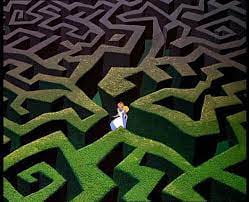Life is a maze, literally and metaphorically speaking!
Life is filled with mazes. My two biggest interests have been working through mind-bending logic puzzles and building my own convoluted contraptions. Solving a puzzle or creating a machine is much like navigating through the twists and turns of a maze—sometimes you think of a solution that works, and at other times you run into “dead ends.” What will you do then? Well, these “dead ends” are exciting to me because they are opportunities to try an even more clever approach. Whether it be sitting stumped for hours on a logic puzzle or troubleshooting the root cause of a malfunction in a gadget, each challenge is like a game in my eyes, motivating me to keep pushing forward and think of alternative avenues until I reach the correct answer or have a working product. As a matter of fact, my joy for challenges stems back to my first puzzles: nonograms, Sudokus, metal wire puzzles, and board games.
To most, it might seem like there’s not enough information to solve these puzzles at first, but that’s part of the fun—taking them one step at a time while searching for subtle clues. After many of these steps, the progress compounds and it becomes even more motivating to make more steps. From decrypting a grid to reveal the hidden mosaic in a nonogram to deducing which numbers should be placed where in a Sudoku, I revel in solving all kinds of logic puzzles. And even physical ones, too: in my free time, I’ll usually try to disentangle the interlocked metal wire pieces. Applying the same logical and levelheaded approach, I also find that strategy games like chess, Risk, and Settlers of Catan give me an opportunity to exercise logic in a creative way. In fact, I sometimes spend hours after a game thinking of “what-if” strategies on how I could have done better.
Working on these puzzles have even helped teach me to think systematically at day-to-day obstacles I see in my own life. Take as an example the time my family found small water spots within our attic. To better understand if these spots were signs of water leakage from old or damaged roof shingles, we needed to have a bird’s-eye view of our roof. Using a small old remote-controlled helicopter toy, an Arduino (a microcontroller platform that controls specialized pieces of hardware using code), a tiny camera module, a power module, and a storage module, I built a makeshift drone for practically free. Coming up with the idea was the easy part; executing it, though, proved to be the real challenge. I started by building a functional video component on the original Arduino board. Then, incrementally, I tried to enable video recording with the camera and storage module. Lastly, I tried attaching all the modules to the toy helicopter in a way that would still enable the helicopter to achieve liftoff with the additional weight. By breaking down this task into smaller and more manageable pieces, I learned it makes the entire building process significantly easier. Ultimately, this new gadget let me see my roof, record the entire flight, and examine the recorded footage at various magnification settings. We found there to be no distinctly misplaced or damaged shingle, but it did give me the chance to play with some new Arduino components that I had not known before.
My “dead ends” make me continually look at things differently, but I know others have their own types of challenges. My “dead ends” challenge me to an extent in which I can find enjoyment in them. My “dead ends” shape my entire life, as odd as it sounds to say that! But, the thing with “dead ends” in mazes is that they teach you to be open to other pathways. As I said before, my life is full of mazes with “dead ends!”

Enjoy Reading This Article?
Here are some more articles you might like to read next: